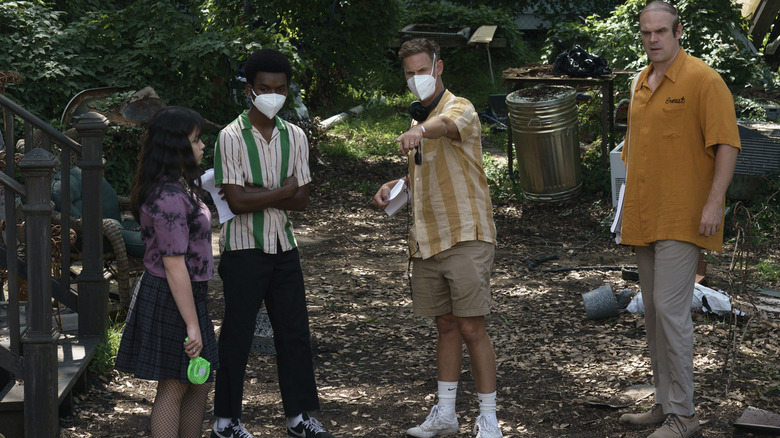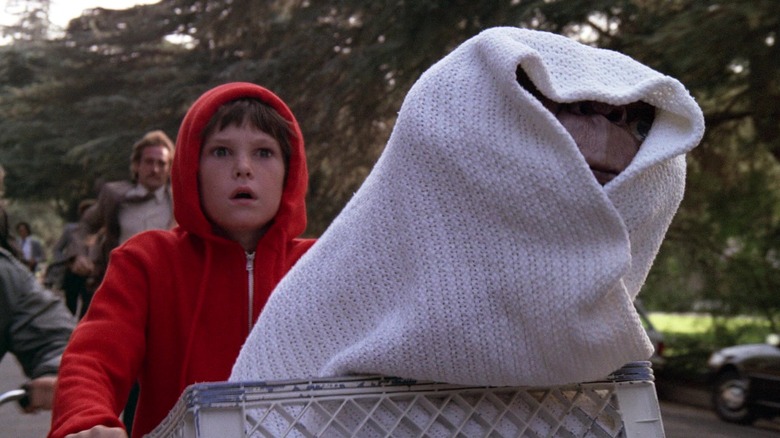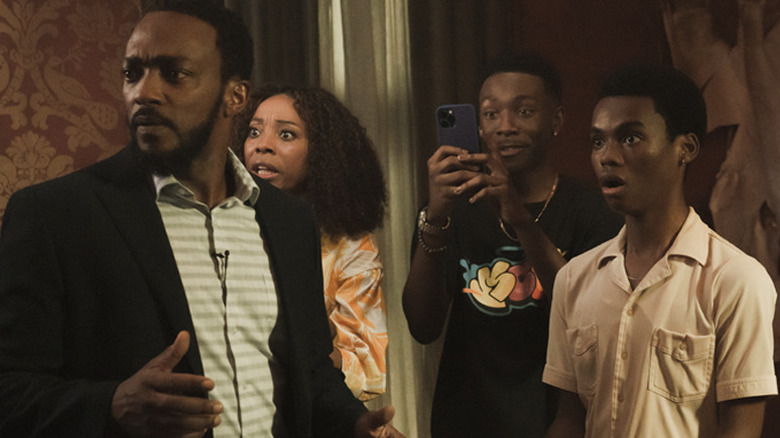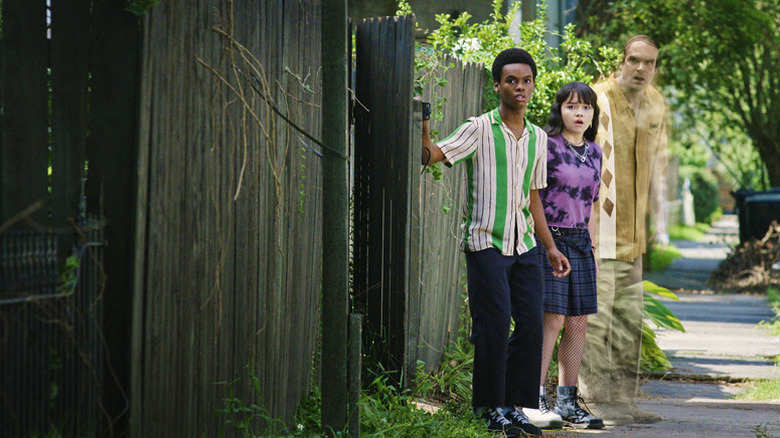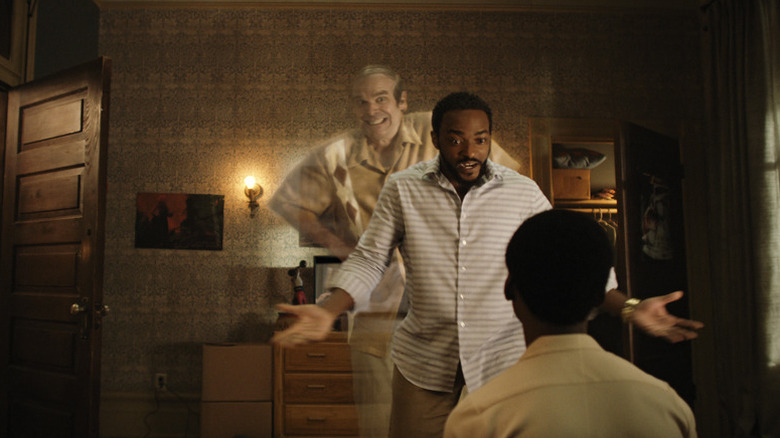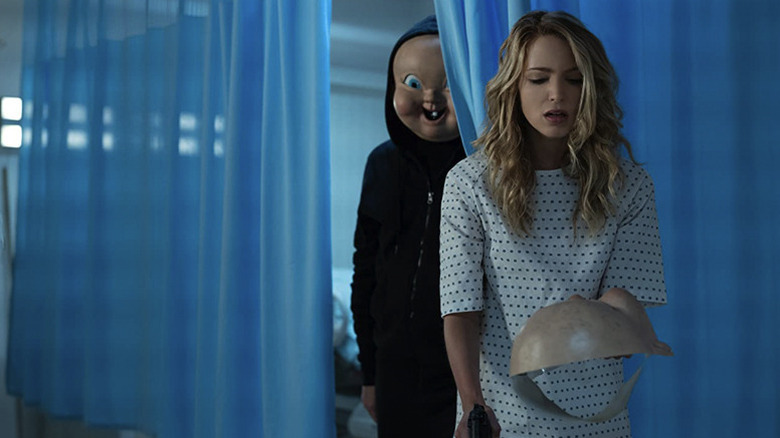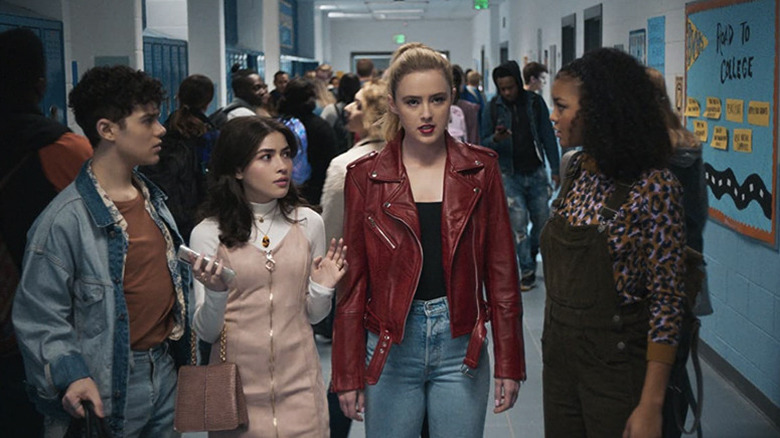We Have A Ghost Director Christopher Landon On The Secret To A Great Amblin Homage [Exclusive Interview]
I've lost count of the number of movies in the past 10 or 15 years that have been promoted as homages to Amblin, Steven Spielberg's beloved production company that was responsible for an influential swath of family-friendly adventure films in the '80s and '90s. While many of those self-described homage projects managed to mimic the sheen and aesthetic of an Amblin production, few have been able to recapture the heart at the center of many of those stories. In my estimation, "We Have a Ghost," the new Netflix movie from writer/director Christopher Landon, actually pulls it off.
The film follows a family (led by Anthony Mackie) who moves into a house that's haunted by a sad ghost named Ernest, played by a silent David Harbour, whose hangdog expression is put to great use here. The family's youngest son, Kevin (Jahi Winston), befriends the ghost and tries to help Ernest pass on to the afterlife, which clashes with his dad's desire to keep Ernest around for as long as possible so he can milk the ghost's presence for internet fame and fortune.
I spoke with Landon in mid-January about why the "Happy Death Day" and "Freaky" filmmaker wanted a change of pace here, his thoughts about the state of the film industry, working with Harbour and Mackie, and the key to making a great Amblin homage.
Note: This interview has been lightly edited for clarity and brevity.
'This really is my love letter to Spielberg, and to E.T. specifically'
This is a different type of movie for you. What made you want to tell this sort of more family friendly story?
I think it's twofold. I'm an Amblin junkie. Obviously, that's my generation. I grew up watching all of these films — "E.T." and "Gremlins" and all this stuff. So when I read [Geoff Manaugh's] short story, I was immediately struck by that tone and that quality, and I thought, wow, this is my opportunity to make this kind of a film. And also I have kids. I have a three-year-old and a five-year-old. So as much as I still love killing people and maiming them and doing all kinds of mayhem, I wanted to be able to do something different, to step outside of the genre a little bit, and to tell a story that is for families.
Aside from Amblin projects, were there any other touchstones that you were looking at for inspiration?
Oh God, yeah. I mean, I was reaching back into "Beetlejuice," which is referenced. I mean, I almost referenced all the movies that inspired this movie in the movie. It's very self-referential in that regard. So I was definitely inspired by that kind of stuff, but this really is my love letter to Spielberg, and to "E.T." specifically. I think that was the most inspiring film for me. Just this unusual connection between a young boy and this ghost. I think there are a lot of parallels there between this and Elliot and E.T.
For something like that, where "E.T." clearly made such an impact on you and you're making a movie that's sort of your spin on that, when you finish your movie, do you send it to Spielberg and say, "Hey, you were an inspiration for me. I just want you to know that this movie's out there," or anything like that?
I don't know how I would do that. [laughs] Like, "Yo, let me get you on speed dial." No, I mean, the irony is, I'm working on a remake right now of "Arachnophobia," and Mr. Spielberg is a producer on the film. I screened the movie for Amblin, for the company. So they all saw it, but I think he was in another part of the world when we had the screening, and I was sort of really just ... I was bummed that he couldn't see it. But then I was also weirdly relieved as well, because I was like, "Oh, f***, what if he hates it?" Anyway, I would love it if he saw it. But I don't know how to make that happen.
'My focus was 100% on the characters'
There are a lot of things that are love letters to Amblin, but they end up falling short. I'm sure you've experienced this. I'm not even talking about "Stranger Things." I happen to like "Stranger Things" a lot, and that show is very much in that Amblin vein. But for movies specifically, what is the secret to cracking that Amblin code that your movie actually pulls off that so many others don't?
I think the secret ingredient is honesty within the relationships of the movie. I think that you can mimic an Amblin movie, but what makes an Amblin movie work is that it is about these families and these characters who are really struggling to connect. As much as I said, "Okay, hey, this is my opportunity to make an Amblin film," I put that aside. Once I announced it, I was like, now shut up about that and just focus on the movie and focus on these characters and what's going on in their lives and how, especially, this father and son are really struggling to find a connection again.
That's what my focus was. My focus was 100% on the characters and really telling their stories with as much honesty as I could within the confines of a very fantastical world. I think that's what those movies do very well, is that they're just kind of telling people stories, but with cool stuff happening.
Tell me why you were interested in David Harbour for the role of Ernest. What did he bring to it?
Oh man. So I'm a very, very, very big David Harbour fan. And I, too, am a fan of "Stranger Things." But also, what I've noticed over the years with David is that he's a theater actor, so he's incredibly versatile. He's so expressive and emotive. So what I wanted for Ernest was someone that I knew could give you the full range of emotions without saying a word.
That is a super, super, super hard thing to do. I remember when I had my first meeting with David, I think one of the first things he said to me was, "I'm kind of terrified of this." And I loved that the challenge excited him. So I knew he was the right guy from day one. But once we had that first meeting, and especially our first day on set, once I saw what he could do live, I was blown away.
For a performance that requires so much — for lack of a better term — "face acting," how did you talk to him about modulating that performance? It's not like you could be like, "All right, a little louder this time" or "a little faster" or whatever you might say to someone giving a verbal performance.
And I don't do that stuff. We talk about a lot about what the character is feeling in the moment, how much he's feeling it, maybe what he's trying not to feel, as well — I think that's just as important. So I really feel like we focused on that type of dialogue when we were approaching the scenes. And again, when you work with someone like David Harbour, too, you're not really giving him a lot of notes. He understands it so incredibly well that it's really just about, put the camera in the right spot and let him do his thing. That's what he does.
'I did debate for a while whether I wanted Ernest to speak somehow or not'
I'm curious about the evolution of projects. I know this is based on a short story, but at any point along the way, whether in writing or in post, was there a different way this story could have gone? Or was it always this was the path that you laid out?
This was the path. I read the short story and I loved the fresh perspective that it presented and that it was a modern ghost story that focused on a family that becomes internet famous. That was the very simple, clean premise of the short story that I connected with. Then I built out all the other things, and this was one of those rare cases where I really sat down to write a rough outline of what I thought this movie could be, and then there was just suddenly a ton of detail, and it took me all the way to the end. So there was no real change to the movie outside of, I did debate for a while whether I wanted Ernest to speak somehow or not. And there was a version of the script where Ernest was able to talk through an old Speak and Spell, but then I felt like it was a cheat.
I also was annoyed because I was like, "Who the f*** wants to hear a Speak and Spell through the whole movie?" [laughs] Some creepy analog robot voice? So I ditched it. That was one of the things that I ditched. Originally, the movie was at Legendary. They were going to try to make the movie. And one of my producers over there, Mary Parent, one of the things that I loved about her was that she really pushed me hard to think bigger in terms of set pieces. There was one much bigger set piece that I had written in the film that got cut out because there was no way we could afford to do it.
But Mary really encouraged me to try and think of and make a bigger movie. For me, that was also the excitement and the challenge of this particular film, because all my movies have been relatively low budget films. This was the first time that I really got to flex that muscle and really tackle something that was a lot bigger than what I'm used to. But I had a blast.
The car chase sequences that actually made it into the movie, I was reminded a tiny bit of the second "Matrix" movie with that big highway chase scene where the ghostly twin characters sort of phase through windshields and into the car's seats. Were you looking at that for blocking inspirations or anything?
I actually didn't look at that at all. And sometimes it's funny — there are certain references that you look for, and then others that maybe you know subconsciously that are there, that you don't want to, to not pollute what you're trying to do. So I didn't watch "The Matrix" movies knowing that there was a little bit of that element in there. So I was like, "No, just let this be a ghost thing and have fun with it."
'Anthony Mackie is impossible to dislike'
Tell me about getting Anthony Mackie. Was he on board immediately? What kind of relationship did you guys have and how did he take to this material?
So again, big fan of Anthony. I love the diversity of his work as well. I love that he's a Marvel guy, but then he does cool weird movies like "Synchronic." He's an interesting actor. And again, another actor I think that has come from the theater world.
The whole casting of the movie really was built around Jahi Winston. I saw Jahi in a movie called "Charm City Kings" and became very fixated on him. So I went to Netflix with Jahi, and I said, "I really want this kid. I think he's the guy. I'd like to build the movie around him." And I was grateful that Netflix was into it.
So that's what kind of led me to Mackie right away. I was like, "Who's this kid's dad?" Because this is sort of the crux of the movie, is these two people. Anthony was the guy just because he is ridiculously charismatic and charming, and that's what Frank needed to be, because Frank otherwise is just an ass****. But if he's a guy who is manipulative and charming in the service of trying to help his family, he becomes much more sympathetic. I really needed that for that character because I didn't want him to be unlikable, and Anthony Mackie is impossible to dislike. So that's why I felt like he was right.
When you came to Netflix and said, "I want to build this movie around Jahi," how much of that process involved them being like, "Okay, he has X many followers on social media" and all that? You hear stories about that sometimes. Is that something you encountered here?
Not at all. Thank God. Not at all. And I've had those experiences in the past for sure, where they try and shove people at you because of their followers and so forth. But Netflix was super supportive of the casting choices that I wanted to make, every single step of the way. I felt really fortunate. But I also think that they were smart. They recognized the work that was behind Jahi and why he was right for the movie. I think it's nice when you work with a studio that trusts the filmmakers that they've hired. You see a lot of second-guessing out there in the business. And then you wonder, well, why did you hire that person then? Trust their instincts.
'Do I wish that this movie was going to be in theaters? F*** yeah'
So you've made movies for theaters and now movies for streaming. Given the volatile nature of especially the last year or so, how do you feel about the state of the industry right now?
I mean, look, I think it's clearly in a state of flux, and I think that people tend to draw themselves toward panic, like moth to a flame kind of stuff. But I think they can happily coexist.
I will always love making movies for the movie theater. That's where I want to be. It's like my church. So it's a really special place to see a film, but the economics of the business can't make that possible for every film. I look at a movie like "We Have A Ghost," and that was never going to get green lit by a studio for a theatrical release. It's just not in the cards, and it hasn't been in the cards for a while. What I do love about streaming is that I think it has allowed for much, much, much more diversity and the opportunity to make mid-level, mid-budget films that the studio system has all but forgotten and ignored. So I appreciate that.
Do I wish that this movie was going to be in theaters? F*** yeah. Because it's really pretty and I've had the benefit of seeing it with an audience. So I know how people react to it in a room, and it's a lot of fun to see with an audience. But that's just sort of the give and take of it all. I accept that, no, I won't get the theatrical experience, but at least the movie got f***ing made, and people will see it. So I'm okay.
I have to ask you about the status of "Happy Death Day 3." Is there any movement on that? I'm a big fan of those films.
No movement at all, sadly. There was a tiny moment where I really felt like I had Universal's attention, but they forgot about me. [laughs] I think it's a really tough one for them, and I'm being really blunt and honest in that the first movie was very successful. It made a lot of money. It was well-received. And the sequel was not. The sequel is loved by people who have seen it, but it did not make a lot of money, and it was not a success for them. So it's very hard to motivate them to make a third movie when the last one just didn't perform. Those are the hard economics of the business.
So I don't know what it would take. There was talk for a minute of it maybe being a Peacock thing. Maybe. Maybe one day. The beauty of it is that my idea, the whole idea for the third movie, it is not dependent on any sort of specific window or timeframe. So I could make it any time, but I mean, as the years draw past, I feel like our chances are dimming.
Does my asking about a project like that provide any value for you as someone who's trying to get a movie made? Do you ever point at interview questions like this and try to make the case to a studio and be like, "See, people want more of this! You should green light this thing!"
I mean, I wish I could. What's funny is that every time Jason Blum is on Twitter and he talks about projects they're doing and whatnot, there's inevitably, there's always at least a few people who say, "But what about Happy Death Day 3?" So there are a lot of people out there who want the movie, but I just think it just isn't enough.
'I just don't know if the economics are there to demand it'
What about a "Freaky" sequel?
Again, it's a weird one because "Freaky" was released in the middle of peak second wave of the pandemic. It was well-received, but it was clunkily released in theaters and it was a terrible strategy. I've been very vocal about that, probably to the dismay of certain people. I think it has a cult following, but again, I just don't know if the economics are there to demand it. But Michael Kennedy, who I co-wrote the movie with, we talk about a sequel all the time, but we also have just kind of moved our focus to other things, and we continue to write stuff together. I'm excited about some of the stuff we've been working on.
You've been around the block enough times to have a good sense of a press cycle and the types of questions that you're going to be asked a lot. Since I'm speaking with you a little bit earlier than normal, what do you think is an aspect of "We Have A Ghost" that you want to highlight, that you suspect you might not get asked about a lot when the press cycle really kicks in?
Oh, Jesus Christ. That's a curve ball. God, what are people not going to ask about? I honestly don't know. I don't know. That's a really tricky one. I think that, look, there's a very emotional component to the movie that I think is unexpected for people. Although if they've seen my stuff, they should start to kind of know that I might go there.
It's not anything that I want spoiled in press, but it's certainly something that I want people to understand, is that this is not a disposable, high-calorie moviegoing experience. I do want people to know that they're going to go on a journey. This is a real journey film, and I hope it takes them to a good place.
"We Have a Ghost" hits Netflix on February 24, 2023.
